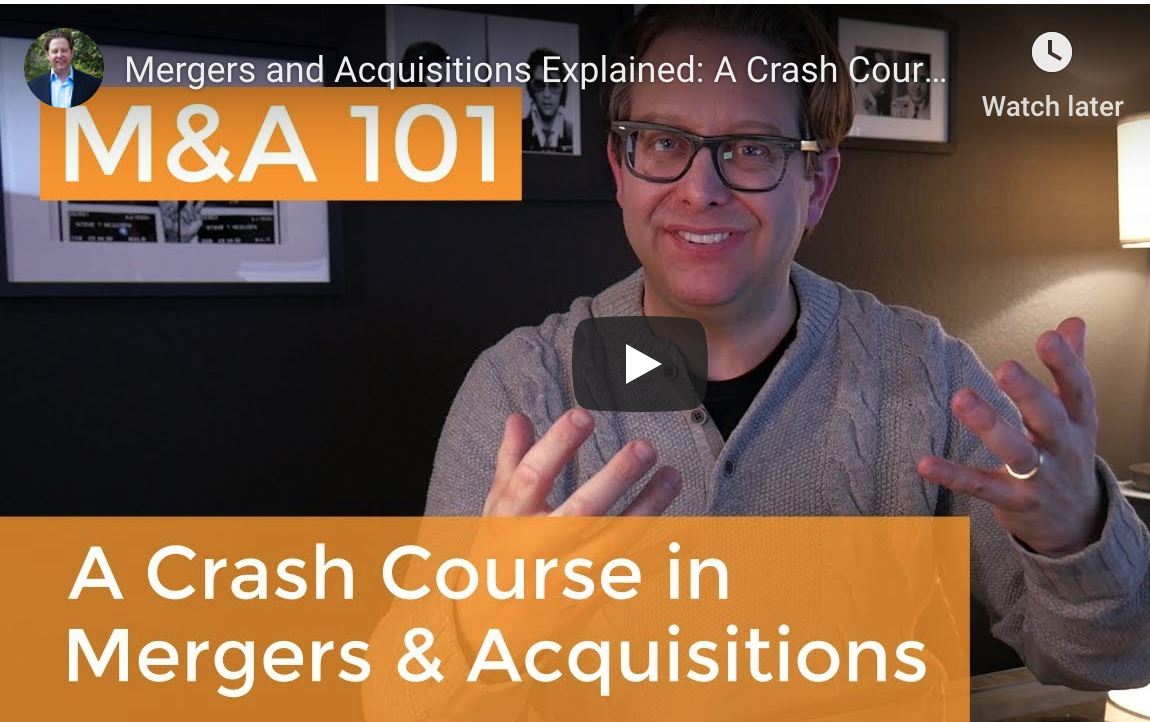Mistakes That Kill M&A Deals
Common Reasons Mergers & Acquisition Deals Die at An Early Stage
According to Pepperdine Private Capital Markets Project, 27% of deals failed to close in 2017.
In a Forbes article a few years back, the author stated that 83% of deals fail to increase shareholder value. That’s scary! It’s a little higher than I’ve heard historically from other sources (closer to 60%), although, either way, the statistics show that M&A is a risky undertaking.
So, why do businesses pursue M&A in the first place?
The textbook answer is that mergers and acquisitions allow companies to leverage substantial growth without having to build organically. In competitive and fast-moving industries, the speed of buying into a market can make the difference between competing and not competing in that market. A lot of technology deals are done for just this reason.
This is why Facebook bought Instagram in 2012. At the time, Instagram only had 30 million users (I know, ONLY! In all seriousness, though, it’s not an enormous number, certainly not the type of number that suggests the market is already cornered). That purchase, by the way, is currently looking like a wildly successful M&A deal.
With motivated parties (buyers needing to move quickly and sellers wanting big pay days), why do so many deals die on the vine?
Just because a buyer and seller are motivated doesn’t mean a deal is a sure thing. M&A deals can be time-consuming and easily derailed if even one thing goes wrong. They’re emotional endeavors and, because the risk of a wrong move is so great, it doesn’t take much to “poison the well” and get the buyer, at least, to rethink the wisdom of closing a deal, especially for an M&A transaction that is of the “bet the firm” variety. Executive teams can’t afford to get that type of deal wrong.
What specifically goes wrong? Well … I’m glad you asked.
The M&A Deal Graveyard
During bad financial times, M&A deal activity slows down, sometimes WAY down. And, the deals that get done are tougher to close for all sorts of reasons, including:
- Banks increase loan qualifying criteria and underwrite deals more rigorously
- Boards and shareholders are concerned about self-preservation rather than growth
- Sellers become disenchanted with the low valuations, sometimes after they’ve signed a letter of intent (i.e., once they have the offer, they second guess it)
- In a down cycle, pessimism abounds and buyers are likely to look harder for reasons not to do deals – due diligence is prolonged and buyers are more likely to walk away than in fast-moving markets filled with optimism
Even during great financial times, deals go south. This may be due to a lack of momentum, which leads to “deal fatigue.” Other common culprits of deals gone bad are:
- Inexperienced acquirers getting cold feet.
- Sellers begin to wonder what they’ll possibly do if they sell the company and revisit the deal entirely.
- Lawyers cautioning their clients about risks inappropriately to the point where nervous clients blow up the deal
- A disconnect between purchasers and sellers about fundamental legal points, including post-closing allocation of risk, which shows up in various deal terms, including indemnification deductibles/baskets, caps (ceilings), the survival period for representations and warranties
- Even in strong markets, there is sometimes uncertainty about where the markets are headed and uncertainty is never good for closing deals – most people (especially in the ambiguity-averse U.S.!) prefer inaction during uncertain times and contexts
That’s a look at deal killers from a high-level. Let’s jump into the weeds and talk about specific things you can do, as a buyer or seller involved in an M&A transaction, to ensure your deal closes.
Mistakes to Avoid When Selling Your Business
As an M&A lawyer, I advise my clients who want to sell their business to remain flexible during the negotiation process. That sounds obvious, although the art is to do it in such a way that isn’t super soft, that doesn’t get you steamrolled on the negotiations. You can do this even on contentious negotiating points by proverbially “disagreeing without being disagreeable.”
Does This Really Work in Business Deals?
As a young lawyer, one of the corporate partners at our firm was a hothead. He’d yell at people, throw things, his face often looked like thousands of blood vessels were just about to burst. It used to scare the bejeezus out of us as young attorneys. And, I’m sure it frightened some lawyers on the other side of the negotiating table. A few, at least. But, it didn’t frighten most of them. And, it wouldn’t frighten me at all today. That approach – going off like a loose cannon at every little thing – doesn’t play particular well with the attorneys on the other side, especially if it happens a lot. When the otherwise calm and collected attorney gets worked up, it has a greater impact. So, without entirely discounting stepping up your anger/tone for a certain context, that’s not the way you need to approach most M&A negotiations. It’s far more effective, in the short-term for getting what you want at the negotiating table, in the mid-term for getting the deal closed, and in the long-term if you’ll be working with the other side after closing, to be clear and firm but pleasant. “I understand your position, although that doesn’t make sense for us. We aren’t willing to agree to that. Is there something lesser that could make this work for you? We want to make it work, although at a certain it doesn’t make sense for us.”
As a seller, be sure you’re ready to exit the business. If you love work, aren’t planning to spend a ton of time with family, don’t have other ideas for businesses to launch, think carefully about whether you’re ready to exit the business. Almost every private M&A deal includes a non-compete from the seller. In Texas M&A deals in the $1 million – $20 million range, a three year non-compete is fairly common. They typically run from two to five years to facilitate efficient due diligence completion, make sure they are financially and mentally ready to sell, so that “Seller’s Remorse” is avoided, and to be strategic about what kind of buyer you are looking to attract.
In 2017 55% of deals were completed by financial buyers and 45% by strategic buyers. A financial buyer is one that isn’t in the industry – a private equity group, for example. They don’t have an existing business that will be synergistic with your business. They are motivated only by getting a strong return on their investment.
If you’re the seller, you should be aware that financial buyers are typically willing to invest less money into an M&A deal than strategic buyers. The main reason for this is that financial buyers are less concerned about post-closing integration, but this also means that they are able to complete the deal faster than a strategic buyer.
Valuation gaps (a disconnect between the buyer and seller of a company regarding what the company is worth) are generally cited as the number one deal killer—as a seller, you can decrease this gap by stimulating competition among many potential buyers. If there are no other hidden deal-breakers discovered during due diligence, then as the seller you have done what you can to maintain momentum with your deal.
Mistakes to Avoid When Acquiring a Business
If you are in the process of or are considering buying a business you can save time and money by solidifying your acquisition strategy, ensuring that your financials are in place and avoid making unreasonable demands. As a buyer, it is important that you are fully committed to finding the right business to acquire or merger with; this takes time, effort, and proper allocation of resources towards completing the process.
Prepare for the deal to take a long time, but don’t let it take too long. Completing due diligence and negotiations will be a time consuming and draining process—that being said, you should do what you can to increase efficiency and maintain momentum throughout the process. This becomes easier if you have put together a great M&A deal team with investment bankers, experienced M&A attorneys, and financial advisors.
Keep the worst-case scenario in the back of your mind and have a plan in place. Do not let these thoughts prevent a good deal from happening but remember that many deals go awry both before and after closing. You will want to have examined all the possible outcomes. . When you are mired in the details, your advisors will be an invaluable sounding board, reminding you of the big picture and noticing details that may have slipped through the cracks. The last bit of advice I can offer to both buyers and sellers of businesses is to allow yourself to walk away. If you can sense that a deal is going bad, let it go.
Why Do Bad M&A Deals Happen (Lessons from Texas M&A)?
Of course, sellers almost always want their deal to close. And, acquiring companies generally want their deals to close. However, from the acquirer’s perspective, a derailed deal may be a blessing in disguise – sometimes you’re better off not doing a deal. Remember the earlier stat? 83% of closed M&A deals failed to increase shareholder value.
Unfortunately, issues that threaten the success of your M&A deal happen for multiple reasons including:
- lack of adequate planning,
- an overly aggressive timetable to closing,
- improper due diligence, and
- failure to look in depth at possible post-closing integration problems, although failure to implement effective integration between companies was voted as the first or second most important concern by 88% of respondents.1
One way to avoid participating in a bad deal is to establish a “last chance” hearing panel, which is charged with coming up with all the reasons to not do the deal. Task them with coming up with any and every reason to discontinue negotiations and withdraw from the process. You want intelligent and well-rounded employees or advisors that deliver questions/concerns that you should consider.
A Few Final Words About Closing Mergers and Acquisitions
Hiring an M&A lawyer, investment banker, and working with an M&A firm can all become hefty investments, which makes it all the more important to prepare yourself completely with the knowledge you need to successfully complete your deals. If you are in the beginning processes of M&A, it is important for you and your M&A team (acquisition lawyer, investment banker, etc.) to explore the plethora of scenarios that may leave you unable to close the deal.
There are many moving parts to any M&A deal, which makes for rich and varied negotiations. The steps in the process may be the same, but deals are done by people with varying motivations and subjective views of what is fair and what matters. No two deals are ever alike. If you have questions for an M&A lawyer, reach out to me at 512.888.9860. I have offices in Austin and Houston, although I represent buyers and sellers all over Texas.

